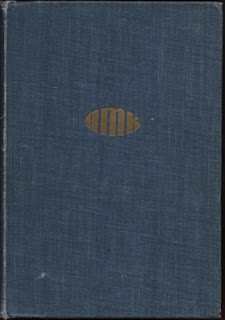Early morning on Boxing Day and I'm lying comfortably in bed. My late mother is to thank. She taught that there is something unseemly in leaving family Christmas dinner to wait overnight for the chance at a $9.99 blu-ray player at Best Buy.
Because I'm done with buying books for this year, the time has come to present my ten favourite acquisitions, beginning with the 1907 Routledge edition of
The Clockmaker pictured above. Bought for a buck a couple go months back, the series title, "Half-forgotten Books", did attract.
Half-forgotten books are what this blog is all about… the three-quarters-forgotten and entirely forgotten, too. What follow are the nine others:
The British Barbarians
Grant Allen
London: Lane, 1895
A second printing of Allen's second biggest book, this one has slowly risen to the top of the pile on my night table. The oldest addition to my collection this year – our literature is still so very young – I won this for one pound in an ebay auction. Shipping charges tempered the victory.
Kalee's Shrine
Grant Allen
New York: New Amsterdam, [1897]
Another Allen. One hundred and sixteen years after his death, books by this son of Kingston are becoming scarce, so I was pleased to get this one for just US$4.99. I understand it takes place primarily on the East Anglian coast and features an oculist.
The New Front Line
Hubert Evans
Toronto: Macmillan, 1927
A gift from James Calhoun, with whom I collaborated in writing
the Introduction to Peregrine Acland's Great War novel All Else is Folly. I'm embarrassed to reveal – and reveal I must – that I was unaware Evans too had served in the conflict.
Hath Not a Jew…
A.M. Klein
New York: Behrman's Jewish Book House, 1940
The first edition of the first book by the first great poet of Jewish Montreal, I found this for a dollar.
King of Egypt, King of Dreams
Gwendolyn MacEwen
Toronto: Macmillan, 1971
The poet's novel of ancient Egypt and Akhenaton, I came across this copy – inscribed by MacEwen – whilst volunteering at our local library's book sale. In the words of the immortal Lou Reed, "you're going to reap just what you sow."
The Three Roads
Kenneth Millar
New York: Dell, [n.d.]
I purchased this first paperback edition at London's
Attic Books, a very pleasant walk from the University of Western Ontario, at which Millar studied English literature.
The Damned and the Destroyed
Kenneth Orvis
London: Dobson, 1962
A second novel from a Montreal writer who seems entirely forgotten. I'd never heard of him, and yet Orvis was published internationally and managed to limp on into the 'eighties. See:
Over and Under the Table: The Anatomy of an Alcoholic (Montreal: Optimum, 1985).
A Japanese Nightingale
Onoto Watanna [pseud Winnifred Eaton]
New York: Harper, 1901
Another second novel, this one written by the most accomplished member of Montreal's remarkable Eaton family. A true joy to hold and behold, I purchased my copy just two months ago at Attic Books.
The Keys of My Prison
Frances Shelley Wees
London: Jenkins, 1956
This Millaresque mystery set amongst the privileged of Toronto is a great read. My pristine first English edition, purchased from a bookseller in Lewes, adds to the delight. Seeing something older than myself in such fine form brings hope for the New Year.
And on that note… A Happy New Year to one and all!
Related post:
























